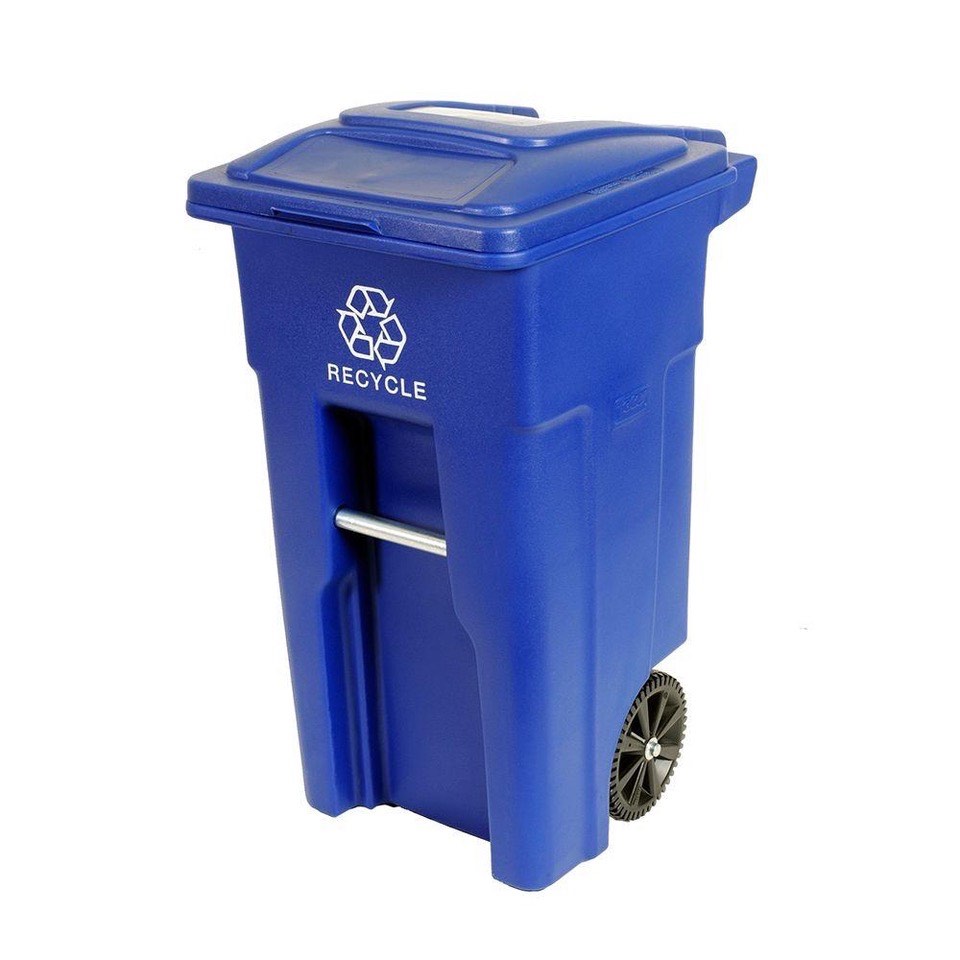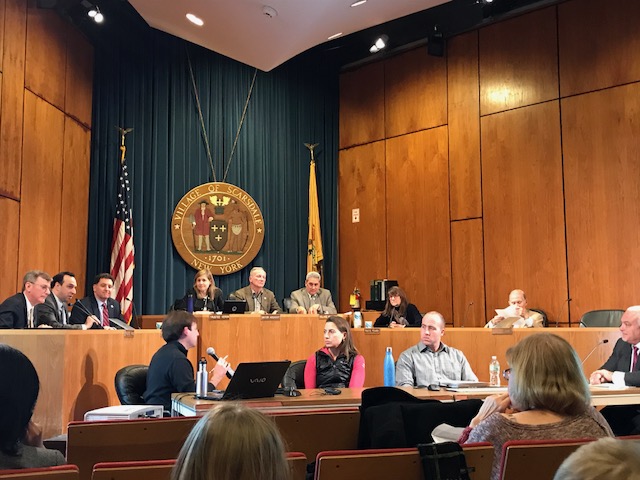Recycling Change Sparks Discussion at Village Hall
- Thursday, 08 February 2018 10:56
- Last Updated: Friday, 09 February 2018 07:39
- Published: Thursday, 08 February 2018 10:56
- Joanne Wallenstein
- Hits: 5158
 A public hearing on a proposed change to the pick-up of trash and recyclables drew an unexpectedly large group to Village Hall on Tuesday January 30. Noting the unusual crowd, Trustee Carl Finger joked, "It's great to see so many people here. I am going to recommend that we do a sanitation study every six months to bring you back!"
A public hearing on a proposed change to the pick-up of trash and recyclables drew an unexpectedly large group to Village Hall on Tuesday January 30. Noting the unusual crowd, Trustee Carl Finger joked, "It's great to see so many people here. I am going to recommend that we do a sanitation study every six months to bring you back!"
Why were residents so passionate about their trash?
The proposed change would mean weekly curbside pick up of both paper and co-mingled recyclables. Currently, paper and bottles and cans are collected on a bi-weekly basis – paper from the curb, and cans, bottles and cartons from the back of the house or the driveway. Under the proposal, food scraps would also be picked up curbside on a weekly basis, along with furniture donations which would be given to Furniture Sharehouse for donation to those in need.
Two points in the plan seem to have rankled residents:
First: the plan would require residents to bring their bottles and cans to the curb for pick-up, rather than dispose of them in the back of the house with their trash.
Second – some are concerned that the placement of paper, bottles, cartons and food scraps at the curb will look unsightly – and that garbage will end up in the streets due to wind, animals and the like.
So though most supported the concept of increased recycling, they saw this plan as a cut in service as their bottles, cans and cartons, (co-mingled recyclables) would no longer be picked up at the rear of the house.
Before hearing public comments, the trustees asked Ron Schulhof from the Conservation Advisory Council to share the results of the group's Sanitation Study.
http://scarsdale10583.com/about-joomla/village-voices/6592-trustees-ponder-revisions-to-sanitation-pick-up-and-recycling-program-as-well-as-led-streetlights
He explained that the goal of the change was to increase recycling and decrease the amount of waste in the trash. The weekly pick up of paper, co-mingled items and food scraps should increase the overall amount of recycling in Scarsdale. He explained that Scarsdale already has high compliance with recycling but a survey of other Westchester municipalities found that most have weekly pick up of paper and co-mingled recyclables. The committee believes that weekly pickup is more convenient and reduces the storage and handling of recyclables.
To those who were concerned about lifting heavy loads, the committee researched and tested different types of bins with wheels to make it easier for residents to pull recycling to the curb. They would also make available food scrap bins with wheels so that those could be pushed to the curb. Exemptions from curbside pick-up would be available for those who are not physically able to bring their items to the street – and the sanitation department could continue back-of-the-house pick up for those who require it.
The Village received 179 emails about the proposed change: 49 for the full program
61 for food scrap pick-up, 21 in opposition to the plan and 31 in opposition to curbside pick up.
Scores of residents lined up to comment on the proposal, some for and some against.
Christine Makuch of 21 Fairview Road spoke in support of the weekly pick up of food scraps. She said, "I already recycles food scraps and would love to stop that errand. Sanitation service here is excellent and I appreciate it."
Michale Ostow of 20 Butler Road was skeptical. He said this could "lead to less recycling in Scarsdale because of the effort to bring stuff to the curb. I have doubts about how many are capable of bringing recycling to the curb. Waste will be thrown out and we will recycle less. All the trash will be moved to the front and we will have an unsightly situation with trash all over the streets. This will not contribute to the beauty of the community. There's a small number of people want to recycle food scraps ... recycle it in your own backyard."
Marian Greene of 43 Butler Road said, "the trend is toward zero food scraps and we are creating food scraps. We are a very wasteful community and it's embarrassing. I have a compost pile. I have a garbage disposal. Our aim should be zero food waste.
I am on the Council on People with Disabilities and I commend the Sanitation Separtment for the way they help elders in our community. People with disabilities would like to have that exemption."
Diane Stern of Rural Drive said that moving recyclables to the curb was no problem for her. She said, "I am going to be 77 years old. I have one of those rolling bins. I can push it with my bum knee and artificial hip. I hardly have any garbage and I support what you're doing."
Jennifer Rossano of 31 Sycamore Road said, "It took us only five days to get used to food scrapping. I am on board."
Rona Shamoon of Edgewood Road said, "I recycle everything. I don't want to leave food on the curb so that the family of raccoons will come out and eat those containers. I read the report. It is written to support the conclusion to do what's best for the 300 families that are recycling the food scraps. A lot of us don't want rotting food in their kitchens. Using the 850 people who bought the kit as the number is not a good way to estimate potential users. I think you are underestimating the number of people who would recycle other materials.
Paulina Schwartz of Oakstwain Road said, "I am in support of all the recommendations and the exemption for the elderly. My kids want to do it. This is important to them. They are more concerned with saving our earth. It's a pain to go to Secor Road – I think this would bring in more recycling."
Referring to the food scrap recycling program, Karen Asher Metviner said, "I've been participating since it started. In Capetown they are rationing water. This is something that has to happen. If you sell it to millenials they will care about preserving the world. Wait until there's no water left to drink, no fish in the ocean.
This is coming soon. People want to be in the right town where they do the right thing."
Mitch Kahn said, "My parents' home is in Florida. All the trash is out on the curb. They are old people and they bring it out. We recycle for the kids – they are in control. It would be great to have the food scraps picked up. I am in strong support of the initiative."
Judith Schiamberg of Elm Road said she was at the meeting on behalf of her sisters and parents who all live in Scarsdale. She said, "My two sisters can't get to Secor ... they work long hours. My mother does participate."
Rona Muttner spoke in support the recommendations of the CAC. She said, "I already bring everything out to the curb. We have lots of stuff. We draw straws to take it out I would be grateful for weekly pick up. It would be half the work and a huge timesaver. It's a win, win, win."
Liat Altman gave her full support and said she was a "proud embracer of the program" that "has completely changed the way waste works in her home."
Susan Douglas of 69 Crane Road said, "Food scraps aren't wasted food, its food that's not going into the garbage. My garbage is super light because of the removal of food scraps."
A Heathcote Road woman said she was Swedish and has lived in several other countries. She said, "What's great about America is pretty much everything in America is voluntary ... people who want to can, people who don't want to don't have to."
Julie Stanley of 31 Brite Avenue said, "Zero waste in general is a better idea. Picking up comingled items weekly would really help. This helps people understand and see the chain of consumerism."
Debbie Rappaport of Brite Avenue spoke in favor of the pick up for Furniture Sharehouse but did not want to "schlep" items out to the curb. She said cans would be "unsightly" and that animals would be able to get into the food scrap bin, saying, "I can tell you the animals will laugh at that plastic."
Beth Zadek gave the proposal mixed reviews, saying "While we support changing the pick-up of paper and commingled recycling to weekly, we do not support the change of having to bring the commingled recycling to the curb. It would be a burden to residents who are unable to navigate the pulling of a heavy bin down to the end of their driveways. We also feel that it would reduce the amount of recycling that those people end up doing. Residents who are not able to drag their commingled recycling to the curb would throw those items out in the regular garbage instead, especially during cold and inclement weather."
Commenting after the meeting, Ron Schulhof Chair of the Conservation Advisory Council said, "We thought the meeting was productive and it was great to hear so much feedback from the community. The CAC also appreciated being able to share with the community why these recycling initiatives are so important: that all our trash in Westchester is burned at an incinerator just 30 minutes from Scarsdale - so every item we can remove from the trash and into a recycling stream not only turns that item into something new but also keeps our air clean. We heard the community embrace the goal of waste reduction and recycling - with overwhelming support for expanding the food scrap recycling program to weekly home pickup at the curb. And while many in the community also voiced support for the change to weekly recycling pickup, we also heard significant concern about the impact of bringing commingled (plastics, metal, glass and cartons) recyclables to the curb would have on our residents who would find this a burden. Given these concerns about implementing weekly recycling by moving commingled to the curb, and being that these two proposals can be implemented independently of each other, we believe it makes sense to separate the discussion of food scrap pickup and weekly recycling. We look forward to continuing the discussion with the Board and Community."
At the end of the meeting, the Municipal Services Committee decided to move forward with the Furniture Sharehouse component of the Conservation Advisory Council recommendation and kept the other two proposals in committee. Given the vast number of comments and the flurry of emails and phone calls, the committee will regroup, consider alternatives and schedule another meeting.















